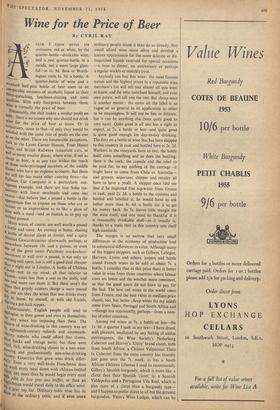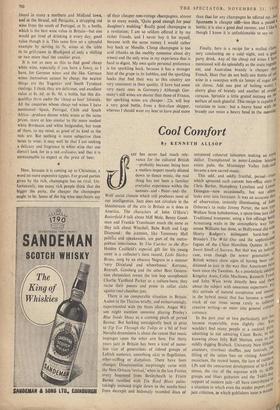Wine for the Price of Beer
By CYRIL RAY CLUB I know serves yin ordinaire, red or white, by the quarter-bottle—drinkable wine, and a real quarter-bottle in a carafe, not a mere large glass- ful—at Is. 9d. Bass or Worth- ington costs Is. 5d. a bottle. A quarter-bottle of wine and a standard half-pint bottle of beer seem to be comparable amounts of alcoholic liquor in their thirst-quenching, luncheon-sluicing and tonic qualities. With only fourpence between them, wine is virtually the price of beer. Presumably, the club makes a similar profit on both : there is no reason why one should not drink Wine for the price of beer at home. Or in restaurants, come to that—if only they would be satisfied with the same rate of profit on the one as on the other. There are honourable exceptions, such as the Lyons Corner Houses, Trust House hotels and British Railways restaurant cars, as Well as many smaller places, where wine, if not as eneal, as beer, is at any rate within the reach I of the underprivileged members of the middle I classes who have no expense accounts. But there are still far too many other catering firms—the Pullman Car Company is a particularly out- rageous example, and there are tiny Soho res- taurants with lower overheads and even less excuse—that believe that a pound a bottle is the appropriate fine to impose on those who are so vicious or so improvident as to like a glass of Wine with a meal—and so foolish as to pay up Without protest. • Many wines, of course, are well worth a pound a bottle and more. An evening at home, sharing a bottle of decent claret at dinner, and a spicy Alsatian Gewurztraminer afterwards, perhaps, at Somewhere between I8s. and a guinea, or even one of the great sweet Palatinate trockenbeer- euunslesen at well over a pound, is not only an :veiling well spent, but is still a good deal cheaper than a night out in London. A bottle of Château ,outet—not, to my mind, all that inferior to t quern--costs less than a seat in the stalls, and ,..3v° and more can share it. But these aren't the ;vines that greedy caterers charge a mere pound ,°r; nor are they the wines that one drinks every mataY at home, by oneself, or with old friends, sharing a pot-luck supper. Unfortunately, English people still tend to l)ologise, to their guests and even to themselves, „et any wines less imposing than these. The eigh b3' attern of wine-drinking in this country was set teenth-century milords and nineteenth- nturY nabobs who could afford fine clarets, ;teat hocks and vintage ports; but these were :all, rich, wine-drinking classes in a non-wine- Cwing and predominantly non-wine-drinking t„9ntrY. Countries that grow wine drink differ- Even a very well-to-do Frenchman does not Wash every meal down with château-bottled et 4r, et, any more than he would begin every meal w Pate de foie gras aux truffes, or than an j1'81ishman would travel daily to the office wear- _6 a grey top hat. Ordinary table wine has its v1/41ce at the ordinary table, and if even more ordinary people drank it than do so already, they could afford wine more often and develop a keener appreciation for the more delicate or dis- tinguished liquids reserved for special occasions —a boss to dinner, an anniversary or' perhaps a regular weekly or monthly treat.
Anybody can buy fine wine: the most famous names and the highest prices in a reputable wine merchant's list will tell you almost all you want to know, and the wine merchant himself, and your own palate, will tell you the rest. But cheap wine is another matter : the name on the label is so vague or so general in its application as often to be meaningless. It will not be fine or delicate, but it can be anything else from quite good to very nasty. Quite good is all one has a right to expect, at 7s. a bottle or less—and quite good is quite good enough for day-to-day drinking. The duty on a bottle of wine that has been shipped to this country in cask and bottled here is 2s. 2d. Workers in the vineyards have to live; the bottle itself costs something and so does the bottling; there is the cork, the capsule and the label to be paid for, to say nothing of the carriage—it might have to come from Chile or Australia— and grower, negociant, shipper and retailer all have to have a profit. A shipper once told me that if he imported free tap-water from France in cask, paid 2s. 2d. a bottle to the customs and bottled and labelled it, he would have to ask rather more than 4s. 6d. a bottle for it to get his money back. So 7s. leaves little margin for the wine itself, and one must be thankful if it is reasonably drinkable stuff—as it usually is, thanks to a trade that in this country sets itself high standards.
The margin is so narrow that very small differences in the economy of production lead to substantial differences in value. Although many of the biggest shippers, such as Gilbeys, Lebegue, Harveys, Lyons and others, import and bottle sound French wines to be sold at about 7s. a bottle, I consider that at this price there is better value in wine from those countries where labour costs are lower and the weather more consistent, so that the good years do not have to pay for the bad. The best red wines in the world come from France, and the best value in medium-price clarets, too, but better cheap wines (to my mind) come from Spain, Portugal and South Africa and —'though less consistently, perhaps—from a num- ber of other countries.
Among red wines at 7s. a bottle or less—the Is. 9d. a quarter I took as my text—I have drunk with pleasure, unalloyed by any feeling of undue extravagance, the Wine Society's Nederburg Cabernet and Harvey's 'Unity' brand claret, both from South Africa; a Chilean Valparaiso Tinto (a Cabernet from the same country has recently just gone over the 7s. mark, as has a South African Château Libertas I used to recommend); Gilbey's Spanish burgundy, which is more like a claret than their Spanish 'claret' is; a Spanish Valdepefias and a Portuguese Vila Real, which is also more of a claret than a burgundy type— and I happen to prefer claret to all but the greatest burgundies. Yates's Wine Lodges, which can be found in many a northern and Midland town, and in the Strand, sell Periquita, a strapping red wine from the south of Portugal, at 5s. a bottle, which is the best wine value in Britain—but one would get tired of drinking it every day, good value though it is. This same firm set a splendid example by serving its 5s. wines at the table in its grill-room in Blackpool at only a shilling or two more than' the counter price. • It is not as easy as this to find good cheap white wine, especially if you have a fancy, as I have, for German wines and the like. German wines themselves cannot be cheap; the nearest things are the Yugoslav and South Tyrolean rieslings. I think they are delicious, and excellent value at 8s. 6d. or 8s. 9d. a bottle, but this dis- qualilizs them under the 'cheap as beer' formula. All the countries whose cheap red wines I have mentioned—Spain, Portugal, Chile and South Africa—produce decent white wines at the same prices, more or less similar to the more modest white Bordeaux and white burgundies, but none of them, to my mind, as good of its kind as the reds are. But nothing is more subjective than tastes in wine; it may well be that I am seeking a delicacy and fragrance in white wine that one doesn't look for in a red ordinaire, and that it is unreasonable to expect at the price of beer.
*
Now, because it is coming up to Christmas, a word on more expensive tipples. For grand parties n given by the rich, champagne has no rival. Un- fortunately, too many rich people think that the bigger the party, the cheaper the champagne ought to be. Some of the big wine merchants say of their cheaper non-vintage champagnes, almost in so many words, 'Quite good enough for your daughter's wedding.' Really good champagne is a revelation; I am so seldom offered it by my richer friends, and I never buy it for myself, because with the same money. I would rather buy hock or Moselle. Cheap champagne is too acid (thanks to the snobby nonsense about dry wines) and the only wine in my experience that is hard to digest. My own quite personal preference is for sparkling hock, because it has a stronger hint of the grape in its bubbles, and the sparkling hocks that find their way to this country are very consistent in their quality. (I have had some very nasty ones in Germany.) Although Ger- many's still wines are dearer than those of France, her sparkling wines are cheaper:. 22s. will buy a very good bottle, from a first-class shipper, whereas I should want my host to have paid more than that for any champagne he offered me. Spumante is cheaper still—less than a pound8 bottle; it is also a good deal sweeter, and 1 like ill though I know it is unfashionable to say so.
. • * Finally, here is a recipe for a mulled claret, very comforting on a cold night, and a good party drink. Any of the cheap red wines I have mentioned will do splendidly as the main ingredi' ent, and Australian brandy is cheaper tin°, French. Heat (but do not boil) one bottle of le", wine in a saucepan with six lumps of sugar and six cloves. Add one pint of boiling water, sherry glass of brandy and another of orange curagao. Sprinkle a little grated nutmeg on the surface of each glassful. This recipe is capable , variation to taste : but a heavy hand with the brandy can mean a heavy head in the morning.















































































 Previous page
Previous page